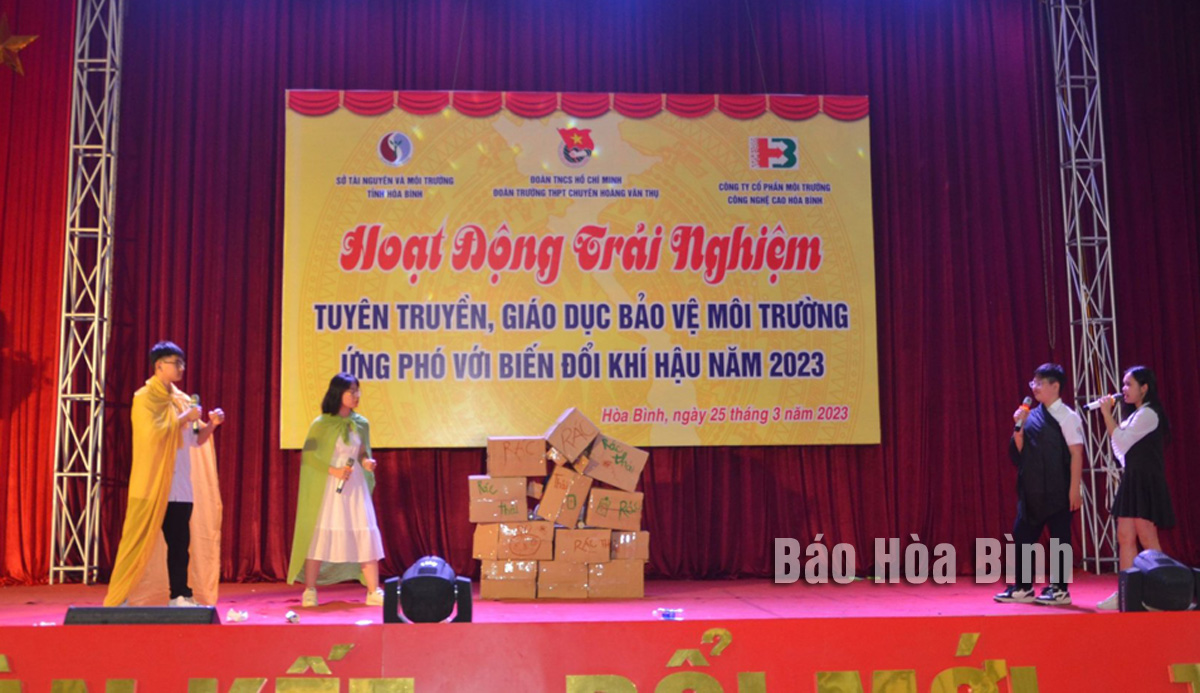
With effective models and methods, the natural resources and environment sector of Hoa Binh province has encouraged people to participate in environmental protection and climate change response activities, thereby contributing to helping the province achieve sustainable development.
Provincial Department of Natural Resources and Environment coordinates with Hoang Van Thu High School for the Gifted to organise an extracurricular activity to educate on environmental protection with the theme of "Green Living".
Nguyen Thi Hoa, Director of the Sub-Department of Environmental Protection under the provincial Department of Natural Resources and Environment, said that to serve the locality’s socio-economic development tasks, the sector has built and carried out a lot of scientific tasks such as investigation, survey, monitoring and evaluation of environmental components in different fields like agricultural and forestry production and processing, mineral exploitation and processing, production of construction materials, animal husbandry, health, and solid waste collection and recycling. It also implements environmental monitoring plans at 150 enterprises twice a year, and collects environmental protection fees for industrial wastewater and deposits for environmental rehabilitation and restoration for mineral exploitation projects.
After the process of environmental monitoring and supervision, the sector has reviewed, classified and made a list of establishments that cause environmental pollution and serious environmental; and conducted inspection and guidance on hazardous waste management.
In order to raise people's awareness, every year, the Department of Natural Resources and Environment proactively intensifies dissemination and education on environmental protection; organises many training sessions for state management officials, socio-political organisations at all levels and businesses in the province on the basic contents of the Law on Environmental Protection, the Law on Biodiversity and other important legal documents.
To date, the rate of household waste collection in urban areas has reached 85%, and 100% of hazardous waste has been collected and treated. The province performs well in planning, management and rational exploitation and use of water resources, as well as in environmental monitoring activities, and investigation and evaluation of wastewater sources released into river basins.
Mai Chau district has firmly established itself as a standout destination on Vietnam’s tourism map, attracting both domestic and international visitors with its breathtaking landscapes, rich ethnic culture, and warm hospitality. However, beyond its natural and cultural charm, a secure and well-managed tourism environment has added to Mai Chau’s appeal.
As Vietnam enters a new phase of economic and administrative reform in 2025, Hoa Binh province is stepping up its efforts to streamline governance, boost economic growth, and attract investment.
The Hoa Binh provincial People's Committee held its monthly meeting on March 26 to review the progress of key projects, assess budget revenue and public investment disbursement, provide feedback on draft documents for submission to the provincial Party Committee's Standing Board, and discuss other important matters related to the committee's governance activities.
Playing a key role in Hoa Binh province’s economic development, Luong Son district has been focusing on science and technology development, innovation, and digital transformation.
Identifying the application of online public services as a key step in administrative procedure reform and e-government building, Kim Boi district has proactively provided services and supported residents and businesses in accessing and utilising full-process online public services promptly and efficiently. The locality aims to lift the rate of end-to-end online public services to over 90%, with all officials and civil servants handling tasks in the digital environment.
Nguyen Anh Tuyet, hailing from a family steeped in the ancient art of herbal medicine, is transforming local medicinal herbs into high-value concentrated extracts, elevating their worth and healing potential.



